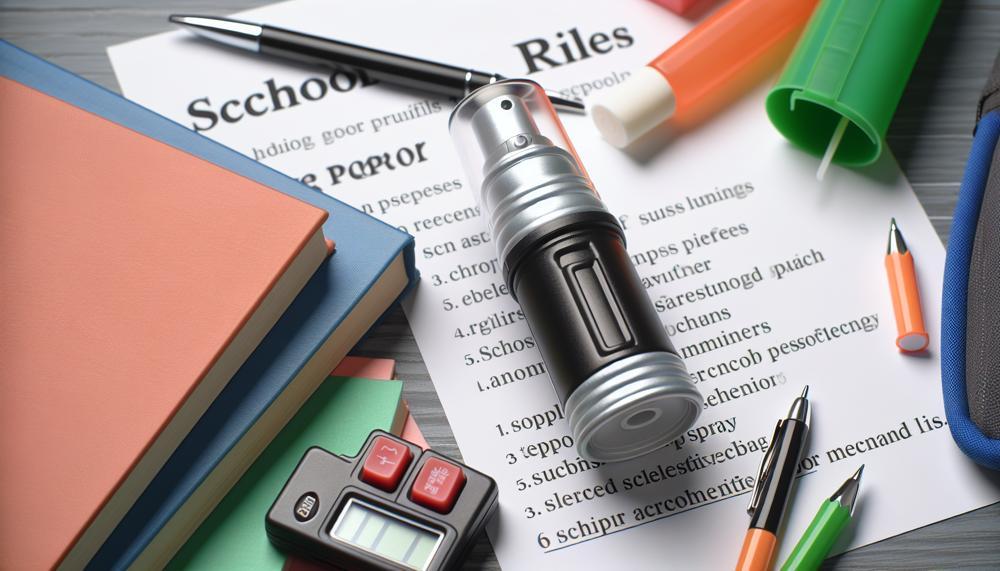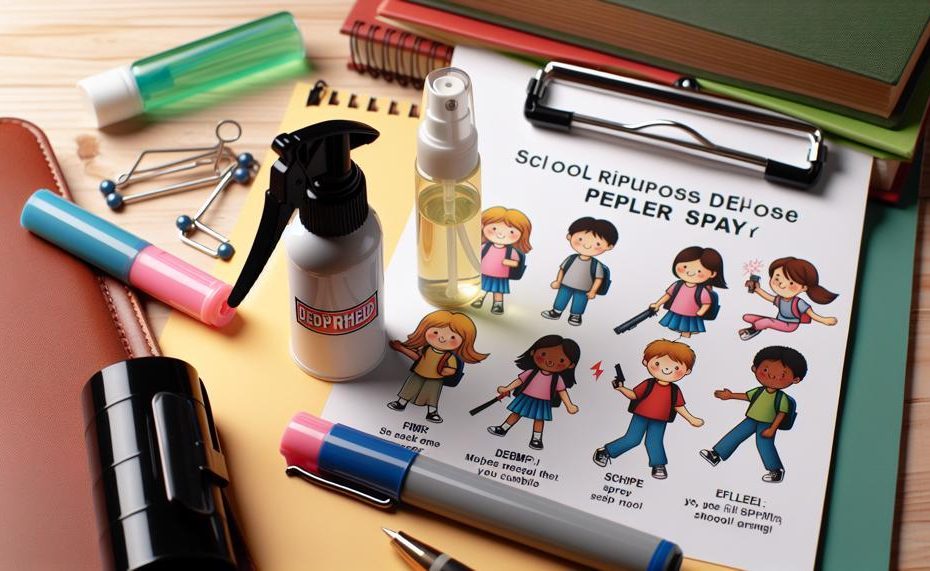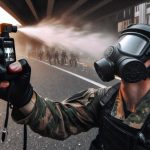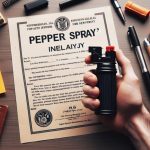Are you a student constantly plagued by worries of safety on campus? Do you feel vulnerable and helpless in the face of potential threats? Well, fret no more. Today’s blog post delves into the controversial topic of pepper spray in schools.
Yes, you read that right – pepper spray. This self-defense tool has gained traction among students as a means of protection against physical harm.
But before jumping to conclusions, let’s take a closer look at the pros and cons of carrying pepper spray on campus.
- The growing concern for safety within school premises
- The efficacy of pepper spray as a self-defense mechanism
- The legalities and limitations surrounding its use
- Personal anecdotes and testimonials from fellow students
- Alternative options to consider for personal safety
Whether you support or oppose this idea, this blog post offers valuable insights and information to aid in your decision about bringing pepper spray to school. So grab your go-to snack and prepare to delve into this heated subject.
Contents
Laws Regarding Pepper Spray at Schools
Laws and policies regulating the possession and use of pepper spray on school premises vary from state to state. To ensure compliance with these regulations, it is crucial to consult both state laws and school district policies regarding pepper spray. While some states, like California, explicitly prohibit it on school campuses, others, such as Texas, do not mention it in their weapons laws. Additionally, schools may have their own policies in place regarding pepper spray, with some allowing it under certain conditions.
However, there are valid reasons behind these regulations on pepper spray at schools. Safety concerns and the potential for misuse make it necessary to ban pepper spray on school grounds. It is crucial to handle pepper spray carefully and responsibly to avoid accidental discharge or misuse as a weapon. As an alternative to pepper spray, personal alarms and self-defense classes can help students protect themselves while following school rules.
In order to carry pepper spray at school, students must petition the administration, obtain parental permission, and adhere to strict guidelines if granted permission. It is important for students to understand that bringing pepper spray illegally can result in serious consequences, including disciplinary action, criminal charges, and a permanent record.
Therefore, while personal safety is a top concern for students and parents alike, it is imperative to abide by the laws and policies in place regarding pepper spray at schools to maintain a safe learning environment for everyone involved.
Seeking exceptions to carry pepper spray at school should not be taken lightly. The process involves petitioning the administration and obtaining parental consent, which can be a lengthy and difficult task.
It is also crucial to note that just because pepper spray is allowed in certain situations does not mean it can be used without consequences. Any misuse or violation of guidelines can result in severe repercussions.
Safety Considerations of Pepper Spray at Schools
Before bringing pepper spray to school for self-defense, it is important to consider the potential risks and take necessary safety precautions. This is a serious decision that comes with important responsibilities, so it is crucial to understand state laws and school policies, potential misuse and escalation of violence, and alternative self-defense options.
- State laws and school policies should be carefully examined as each state and district may have different regulations. While federal laws do not specifically address pepper spray in schools, some states may prohibit its possession and use on school grounds altogether. Therefore, it is crucial to consult these laws and policies before making a decision.
- Misuse or accidental exposure of pepper spray can have serious consequences, making it important to understand how to properly handle and store it. Additionally, the presence of pepper spray in a school setting can potentially escalate violence and put others at risk. As such, it is important to carefully consider the potential consequences of carrying pepper spray to school.
- Before deciding on bringing pepper spray to school, alternative self-defense options should also be considered. Personal alarms and self-defense classes can provide effective means of protection without the potential risks and consequences associated with pepper spray.
- Furthermore, students should follow safety measures such as avoiding risky situations, being aware of their surroundings, and reporting any suspicious activity. Seeking an exception to bring pepper spray to school involves petitioning the administration, obtaining parental permission, and following strict rules and regulations set by the school.

It is crucial for students and parents to thoroughly understand the risks and responsibilities before bringing pepper spray to school for self-defense. Violating these rules can have serious consequences, including disciplinary action from the school, criminal charges, a permanent disciplinary record, and a negative impact on future opportunities.
Alternatives to Pepper Spray for Self Defense
In a school setting, there are several options for self defense tools that can be used in place of pepper spray. These alternatives include hornet spray, keychain weapons, sound alarms, and self-defense training.
| Alternative | Description | Pros | Cons |
|---|---|---|---|
| Hornet Spray | An aerosol spray containing a chemical similar to pepper spray. | – Cost-effective
|
– Inconvenient size for carrying
|
| Keychain Weapons | Specially designed weapons disguised as keychains, such as metal-shaped head keychains and stun guns. | – Compact and easily accessible
|
– May be prohibited in certain locations
|
| Sound Alarms | Small devices that emit a loud noise when activated, meant to alert others and scare off attackers. | – Easy to carry and use
|
– Relies on others responding quickly
|
| Self-defense Training | Learning techniques and strategies to defend oneself against an attacker, often through martial arts classes or workshops. | – Provides long-term skills and knowledge
|
– Requires time and money investment
|
In the end, it is crucial to select a self defense tool that is easily accessible and can be used effectively by the individual. It is also important to have a thorough understanding of state laws and school policies before bringing any type of self defense tool to school.
Seeking an Exception to Bring Pepper Spray
There are certain situations that allow individuals to carry pepper spray at school. However, it’s important to keep in mind that bringing pepper spray to school is generally not allowed due to safety concerns. It is crucial to be familiar with state laws and school policies before considering bringing pepper spray to school.
Some exceptions may include:
- State laws: In some states, individuals can possess and use pepper spray on school grounds as long as they meet certain criteria. For example, students over the age of 18 in California can carry pepper spray at school with written permission from a parent or guardian.
- School district policies: While federal laws do not specifically address pepper spray at schools, individual school districts may have their own regulations in place. Some districts may permit students to bring pepper spray with certain restrictions, such as obtaining parental permission and only using it for self-defense purposes.
- Special circumstances: In rare cases, schools may make exceptions for students who have a valid reason for needing pepper spray, such as a documented history of being targeted for violence or harassment. In these situations, the student must request permission from the administration and provide evidence of their need for self-defense.
It is important to remember that even with these exceptions, strict guidelines must be followed in order to legally possess and use pepper spray on school grounds. It is also essential to consider alternative options for self-defense and only use pepper spray as a last resort in dangerous situations.
Consequences of Bringing Pepper Spray Illegally
Bringing pepper spray to school without proper authorization or permission can have serious consequences for students. These consequences may include disciplinary action, criminal charges, and legal repercussions.
Let’s take a closer look at the potential consequences in more detail.
Disciplinary Action:
Schools have strict policies against weapons or any item that poses a threat to the safety of students and staff. If caught with pepper spray, students may face disciplinary action such as suspension or even expulsion from school.
This not only affects the student’s education but also their future prospects as it goes on their permanent record.
Criminal Charges:
In some states, it is illegal for minors to possess pepper spray without proper authorization or permission. If caught with pepper spray, students may face criminal charges and have to appear in court.
This can lead to fines, community service, and even imprisonment depending on the severity of the situation.
Legal Repercussions:
Using pepper spray against someone without justification, such as self-defense, is against the law. If a student uses pepper spray on another person without a valid reason, they could face legal repercussions such as assault charges and civil lawsuits.
This can have serious consequences for the student’s future and reputation.
| Consequences | Description | Example |
| Disciplinary Action | Suspension or expulsion from school | A student is temporarily removed from school or permanently expelled for bringing unauthorized pepper spray. |
| Criminal Charges | Fines, community service, imprisonment | A student is charged with possession of an illegal weapon and is required to pay a fine or perform community service. |
| Legal Repercussions | Assault charges, civil lawsuits | A student is sued by someone they used pepper spray on without a valid reason, facing serious legal consequences. |
Conclusion
In conclusion, the debate over whether or not to allow students to bring pepper spray to school for self-defense is a complex and contentious one.
While the safety of students is of utmost importance, it is crucial to adhere to the laws and regulations in place regarding pepper spray on school grounds. The potential risks and repercussions of carrying pepper spray without proper authorization or using it recklessly should not be underestimated.
Requesting permission to bring pepper spray to school involves a lengthy process with strict guidelines that must be followed.





